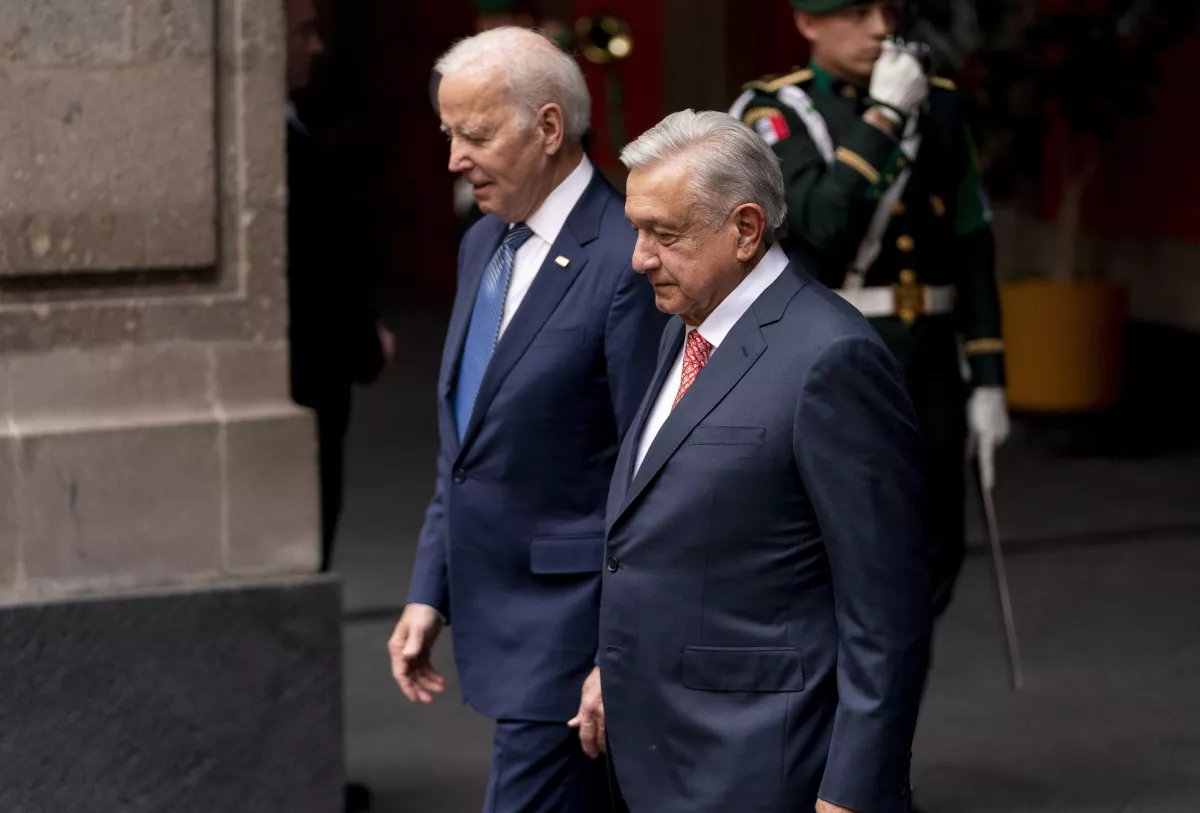Mexico. In the first visit to Mexico by a U.S. leader in almost a decade, President Biden met with Mexican President Andrés Manuel López Obrador on Monday to discuss trade, the drug war and record levels of illicit immigration in a wide-ranging conversation that was mostly cordial but at one point turned testy as the Mexican leader demanded his U.S. counterpart do more to help the region.
“End with this forgetfulness, this abandonment, this disdain toward Latin America and the Caribbean,” López Obrador told Biden in a meeting at the National Palace in Mexico City. López Obrador said Biden was uniquely poised to improve life across a region beset by inequality, telling him that “you hold the key in your hand.”
Biden responded by saying that the United States had invested “tens of billions of dollars” in Latin America in the last 15 years, while also donating more than any other country globally to causes worldwide.
The U.S. “responsibility,” Biden said pointedly, extends well beyond the Western Hemisphere.
The sharp exchange, as TV cameras rolled, dramatized some of the daunting challenges facing the two nations at what Biden referred to as an “inflection” point that would “determine what the world looks like” in coming decades.
The two countries are under pressure to work together on issues including drug smuggling and immigration even though they have sometimes starkly divergent views on those and other topics, including foreign policy, energy and climate change.
Biden and the leftist Mexican leader will meet on Tuesday with Canadian Prime Minister Justin Trudeau, bringing together the leaders of the three nations that represent about a third of global economic output.
It is the second so-called Three Amigos summit, as the trilateral meetings are informally known, to be held after a several year hiatus during the presidency of Donald Trump, who eschewed many diplomatic traditions.
Trump never came to Mexico while in office, though he developed a friendly relationship with its leader, despite López Obrador’s leftist pedigree and Trump’s frequent rhetorical broadsides targeting Mexico and Mexican immigrants.
López Obrador’s relationship with Biden has been cooler. He waited more than a month to congratulate Biden after he beat Trump in the 2020 election, and last year he boycotted a major regional summit in Los Angeles because Biden didn’t invite the authoritarian regimes of Cuba, Venezuela and Nicaragua.
Despite the tensions on display Monday, analysts generally viewed the summit and its promise of dialogue as a positive step among strategic and economic allies.
The trilateral summit, said Tony Payan, director of the Mexico Center at Rice University’s Baker Institute, “shows that Biden is very serious about engaging both Canada and Mexico again, leaving the relative isolationism of the Trump administration behind.”
The trip began amicably late Sunday, when López Obrador met Biden at the new Felipe Angeles International Airport, a prized infrastructure project of the Mexican president, and rode with him into the capital in Biden’s limousine; the next day, López Obrador described the encounter as “very pleasant” and called Biden “a friendly person.”
The Mexican and U.S. presidents and their teams met Monday at Mexico’s National Palace.
On the agenda were topics that have come to define the bilateral relationship, including immigration and the drug trade.
Biden “is looking to dive deep on a set of issues that are priorities for his administration,” U.S. national security advisor Jake Sullivan told reporters in Mexico City. Those concerns, Sullivan said, include the smuggling from Mexico of fentanyl, a synthetic opioid blamed for the deaths of tens of thousands of people in the United States.
U.S. authorities would like to see Mexico do more to target clandestine drug labs and clamp down on smuggling of the substance.
Mexican officials, meantime, have long called on Washington to cut down on the illicit trafficking of weapons — including assault rifles — from the United States to Mexico. The arms often end up in the hands of organized crime groups that hold wide sway through much of Mexico.
How best to tackle smuggling and organized crime has been a point of contention between the two countries since López Obrador took office. The countries’ long-standing security partnership nearly crumbled in 2020, when the U.S. arrested retired Gen. Salvador Cienfuegos — Mexico’s defense minister from 2012 to 2018 — at Los Angeles International Airport, accusing him of conspiring with drug traffickers. The Mexican military was outraged, and López Obrador threatened to withhold future security cooperation with the U.S. unless Cienfuegos was freed.
The U.S. dropped the charges against Cienfuegos and he was returned to Mexico, where he went free. López Obrador angered U.S. law enforcement when he accused the Drug Enforcement Administration of trying to frame Cienfuegos, calling the charges “garbage.”
But U.S. officials privately say that tensions have diminished recently and López Obrador’s administration has delivered repeatedly on one key U.S. priority: the arrest of high-profile drug kingpins.
Days after López Obrador met with Biden at the White House in July 2021, Mexican forces captured Rafael Caro Quintero, a cartel member believed to be behind the killing of U.S. Drug Enforcement agent Enrique “Kiki” Camarena in 1985.
Many here have speculated that the Mexican government’s recapture last week of Ovidio Guzmán, son of imprisoned drug lord Joaquín “El Chapo” Guzmán, may have been another “gift” to Washington ahead of Biden’s visit.
Immigration, too, has been a source of bilateral tension — and in recent months of joint cooperation.
U.S. authorities recorded more than 2 million detentions of migrants along the U.S.-Mexico border, a record, during the fiscal year that ended Sept. 30.
Days before Biden arrived in Mexico City, his administration announced a controversial shift in immigration policy that appeared to have Mexico’s blessing.
In recent years, even as hundreds of thousands of migrants from Mexico, Central America and elsewhere were swiftly expelled under Title 42, a public-health rule invoked by Trump, migrants from Cuba, Nicaragua, Venezuela and some other countries were generally allowed to enter the U.S. and pursue asylum hearings. That is partly because their home countries were too unstable or too politically at odds with Washington for officials to coordinate large-scale returns, and partly because Mexican officials at the border refused to accept returnees from those countries after they were detained in the United States.
In October, as the number of Venezuelan migrants increased, U.S. and Mexican authorities announced that Venezuelans arriving at the border without authorization would rapidly be returned to Mexico.
Under the new guidelines, the border expulsion policy has expanded further: Migrants from Cuba, Nicaragua and Haiti who cross into the U.S. without authorization will also immediately be sent back to Mexico, even if they are seeking asylum, officials say. Mexico has agreed to accept a total of up to 30,000 deportees from the four countries each month. López Obrador said on Monday that Mexico might be willing to accept even more deported migrants.
Immigrant advocates have denounced the plan as a human rights violation that denies people the fundamental right to file claims for refuge in the United States.
While the leaders have attempted to portray themselves as a united front on immigration and fighting crime, they are openly at odds over López Obrador’s nationalist energy policies.
Since taking office in 2018, the Mexican president has attempted to roll back a constitutional reform instituted in 2013 by his predecessor that opened the door to more foreign involvement in the energy sector. The U.S. and Canada argue that those efforts discriminate against U.S. and Canadian companies and favor Mexico’s state oil company and its national electricity utility.
In July, the U.S. and Canada filed a formal complaint against Mexico under the countries’ joint trade deal, the U.S.-Mexico-Canada Agreement.
One likely point of contention between Biden and López Obrador is climate change, a priority issue for the Biden administration, but not one as openly embraced by the Mexican president.
López Obrador has reactivated coal plants, halted new renewable energy projects, spent billions building a state-owned oil refinery and has pushed legislation that would require Mexico’s electric company to take more power from state-run plants, which are fueled largely by crude oil and coal.
His policies, said Payan of Rice University, couldn’t be more different from those of Biden, who has pushed for historic investments in clean energy and is seeking to wean the nation and world off fossil fuels.
“The Biden administration is very committed to combating climate change,” Payan said. “ And I think Mexico has to be part of it.”
Source: Los Angeles Times.



































